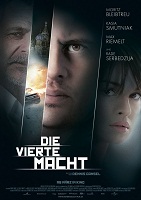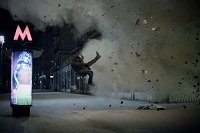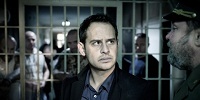Warren Cantrell is at the 2012 Seattle International Film Festival seeing as many movies as he can and filing reviews and reports as he goes.
 It’s an entirely common and acceptable practice within Hollywood circles to harvest Asian and European cinemas for the best and brightest ideas for adaptation and release into a domestic market that’s become a saturated, largely stagnant artistic pool. And this is not to say that there’s a shortage of innovative ideas and/or talented storytellers in the States, it’s just that the people running Hollywood’s studios are a collection of glorified accountants and analysts who crunch numbers with more alacrity than what they experience when reading scripts. And that’s fair. For a statistician it’s far more reliable to put money into sure things: proven commodities. This is why sequels, comic books, and literary franchises are getting so many green lights and blank checks these days, and why the waters of the aforementioned pool are growing darker still.
It’s an entirely common and acceptable practice within Hollywood circles to harvest Asian and European cinemas for the best and brightest ideas for adaptation and release into a domestic market that’s become a saturated, largely stagnant artistic pool. And this is not to say that there’s a shortage of innovative ideas and/or talented storytellers in the States, it’s just that the people running Hollywood’s studios are a collection of glorified accountants and analysts who crunch numbers with more alacrity than what they experience when reading scripts. And that’s fair. For a statistician it’s far more reliable to put money into sure things: proven commodities. This is why sequels, comic books, and literary franchises are getting so many green lights and blank checks these days, and why the waters of the aforementioned pool are growing darker still.
In this way, it’s entirely possible, nay, likely, that The Fourth State (German: Die vierte Macht) will find itself optioned or otherwise remade into an American franchise, one that will almost certainly try to squeeze every drop of exquisitely crafted suspense and intelligent intrigue into their adaptation. A German film, it follows Paul, played by Moritz Bleibtreu, an actor some will recognize as Manni from Run Lola Run. Paul is a celebrity journalist, and The Fourth State begins as he arrives in Moscow, about to begin his new job as the nightlife and culture columnist for a second-rate pop and fashion rag.
 As Paul settles into his apartment, which is actually his deceased father’s old residence, the audience gets the sense that the journalist is dodging some emotional ghost. Perhaps his dad? The movie modestly tosses out a few hints in the opening minutes that imply that Paul’s father, who once worked for the same magazine in Moscow, had been a serious journalist, a legacy Paul clearly (and somewhat defiantly) does not seem interested in. There’s a nagging emptiness to Paul, however: the scent of which is unmistakable due in no small part to a marriage of superb acting and astonishing directing. Early on, the shots have a shallow focus with a lot of shade, and present scenes built on expression with little dialogue, something that gives the picture a very Michael Mann feel (in a good way).
As Paul settles into his apartment, which is actually his deceased father’s old residence, the audience gets the sense that the journalist is dodging some emotional ghost. Perhaps his dad? The movie modestly tosses out a few hints in the opening minutes that imply that Paul’s father, who once worked for the same magazine in Moscow, had been a serious journalist, a legacy Paul clearly (and somewhat defiantly) does not seem interested in. There’s a nagging emptiness to Paul, however: the scent of which is unmistakable due in no small part to a marriage of superb acting and astonishing directing. Early on, the shots have a shallow focus with a lot of shade, and present scenes built on expression with little dialogue, something that gives the picture a very Michael Mann feel (in a good way).
The Fourth State presents Moscow as a cold, busy, yet altogether empty place which is made all the more foreign due to Paul’s inability to communicate effectively in Russian. Speaking to those around him in English, and unable to decipher the quiet whispers of the natives around him, the audience is plunged deeper into the shadowy fog of Moscow right alongside the film’s protagonist as the plot’s various corners begin to unfold.
 And boy, do they ever unfold! Tickled by his father’s legacy, and with one of Cupid’s arrows lodged firmly in his hip, Paul goes after a fiery journalist and activist, Katja (Kasia Smutniak) who gets the naïve journalist tangled up in a terrorist plot with teeth enough to make a shark flinch. One thing leads to another, and before he can say “I am a doughnut,” Paul is looking down the barrel of a 20-to-life stretch in a Russian gulag, a prospect that makes the same duration at San Quentin look like a stay at the fucking Waldorf Astoria.
And boy, do they ever unfold! Tickled by his father’s legacy, and with one of Cupid’s arrows lodged firmly in his hip, Paul goes after a fiery journalist and activist, Katja (Kasia Smutniak) who gets the naïve journalist tangled up in a terrorist plot with teeth enough to make a shark flinch. One thing leads to another, and before he can say “I am a doughnut,” Paul is looking down the barrel of a 20-to-life stretch in a Russian gulag, a prospect that makes the same duration at San Quentin look like a stay at the fucking Waldorf Astoria.
This reviewer is hesitant to proceed any further, plot-wise, for fear of ruining or otherwise spoiling so much as a fraction of The Fourth State, a movie so meticulously crafted that, as a 21st century suspense thriller, it has few equals. The film actually begins with a disclaimer to assure viewers that the picture is entirely fictional, a telling caveat to a movie dealing with make-believe subject-matter that all seems frighteningly plausible.
 And while the actors and director Dennis Gansel certainly deserve the majority of the credit for this, it certainly helps that the film takes place almost entirely in Moscow: a city within a country that’s got a long history of “misplacing” dissidents and prisoners. Again, though, this is further enhanced by the work of Gansel, whose lighting and set design is pitch-perfect in scene after scene. Everything from the clothing of the Russian Secret Service to the design of their interrogation room seemed to emanate intimidation and fear.
And while the actors and director Dennis Gansel certainly deserve the majority of the credit for this, it certainly helps that the film takes place almost entirely in Moscow: a city within a country that’s got a long history of “misplacing” dissidents and prisoners. Again, though, this is further enhanced by the work of Gansel, whose lighting and set design is pitch-perfect in scene after scene. Everything from the clothing of the Russian Secret Service to the design of their interrogation room seemed to emanate intimidation and fear.
Attention to these sorts of details in conjunction with a haunting score and crisp performances from every member of the lead and supporting cast elevated The Fourth State into exclusive company, for in roughly 105 minutes, the picture presented a well paced, fully realized action thriller on par with anything released these last dozen years (in any country). In Paul, a man who isn’t a rogue spy, superhero, or vampire, the audience has a believable, identifiable protagonist who is at the center of a dizzying conspiracy that he’s uncovering in fragments right alongside the audience. The journalist’s confusion and vulnerability are a refreshing take on the Euro-amnesiac thriller, especially since Paul doesn’t ever snap-to, and start busting out wild Aikido moves all of a sudden.
 The journey is a thrilling one, and is made all the more engaging because of the tightly wound plot put to perfect use by a director who clearly knows when and how much line to let out as the events progress. There’s a lot of moving parts to this picture, and director Dennis Gansel makes sure all come together flawlessly as the pieces of Paul’s puzzle eventually fall into place.
The journey is a thrilling one, and is made all the more engaging because of the tightly wound plot put to perfect use by a director who clearly knows when and how much line to let out as the events progress. There’s a lot of moving parts to this picture, and director Dennis Gansel makes sure all come together flawlessly as the pieces of Paul’s puzzle eventually fall into place.
It is for this reason that The Fourth State will almost certainly reappear in American cinemas with Shia LeBeouf as Paul, and Jessica Biel as Katja, for the outline of near-perfection is already in place, ready to be traced. This reviewer will almost certainly get back out to the Seattle International Film Festival, where this film is currently playing, to get a repeat viewing of The Fourth State in, for it will be hard to remember what once was after Hollywood’s analysts and accountants get their hands on this gem.





Comments on this entry are closed.